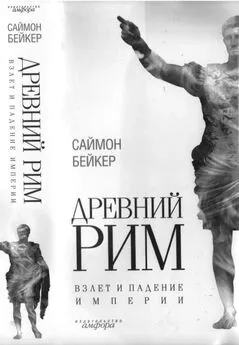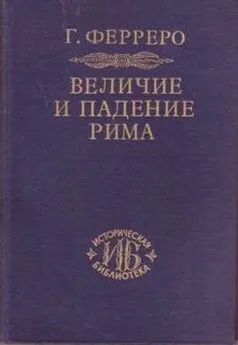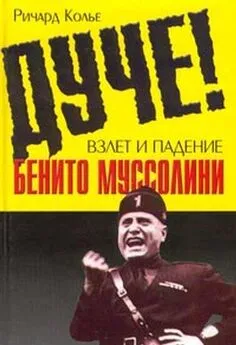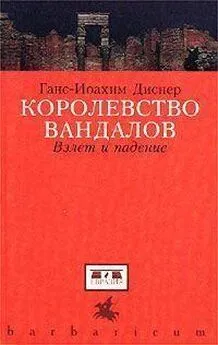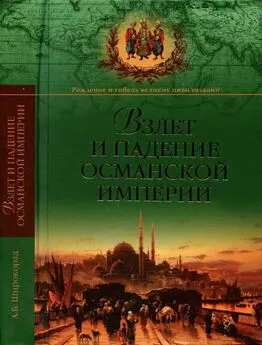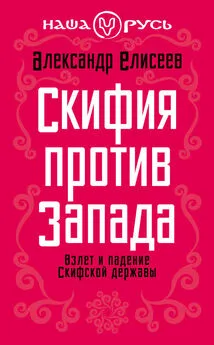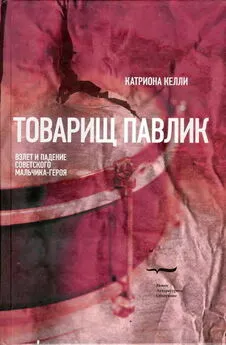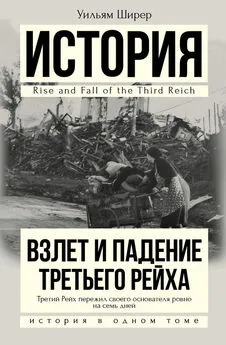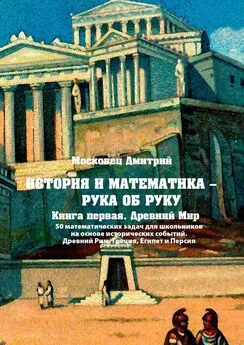Саймон Бейкер - Древний Рим. Взлет и падение империи
- Название:Древний Рим. Взлет и падение империи
- Автор:
- Жанр:
- Издательство:Издательство Амфора
- Год:2008
- Город:Санкт-Петербург
- ISBN:978-5-367-00673-5
- Рейтинг:
- Избранное:Добавить в избранное
-
Отзывы:
-
Ваша оценка:
Саймон Бейкер - Древний Рим. Взлет и падение империи краткое содержание
В книге «Древний Рим» рассказывается о величайшей из всех существовавших в мире империй. Рассматривая шесть важнейших поворотных пунктов, во многом определивших историю Рима, автор строит свое захватывающее повествование о взлетах и падениях первой в мировой истории сверхдержавы — государственной машины, непревзойденной в своей жестокости, гениальности, стремлении к власти.
Книга является литературной версией сенсационной серии передач на канале Би-би-си. Исследуя деятельность сложных, зачастую порочных личностей таких могущественных властителей, как Помпеи Великий, Юлий Цезарь, Август, Нерон и Константин, Саймон Бейкер подводит солидную историографическую базу, особо останавливаясь на наиболее любопытных аргументах. А в результате получается история Древнего Рима — величайшей в мире империи, непревзойденной в своей жестокости и гениальности.
Древний Рим. Взлет и падение империи - читать онлайн бесплатно полную версию (весь текст целиком)
Интервал:
Закладка:
Astin, A.E.; Walbank, F.W.; Frederiksen, M.W.; Ogilvie, RJV1. (eds), Cambridge Ancient History, Volume 8: 'Rome and the Mediterranean to 133 вс' (Cambridge, 1989)
Beard, Mary and Crawford, Michael, Rome in the Late Republic. Problems and Interpretations (London, 1999)
Brunt, P. A., Italian Manpower (Oxford 1971)
ANCIENT SOURCES
For the Roman conquest of the Mediterranean see:
Polybius, Histories: The Rise of the Roman Empire (London, 1979) (selected excerpts)
Livy, The War with Hannibal (Bks 21-30) (London, 1970)
Livy, Rome and the Mediterranean (Bks 31-45) (London, 1976)
In Loeb Classical Library edition see:
Polybius, The Histories (Cambridge, Mass., 1922-27)
Appian, Roman History (Cambridge, Mass., 1912-13) both of which give the full Greek text and translation.
For accounts of the lives of Tiberius Gracchus and Gaius Gracchus see:
Plutarch, Makers of Rome (London, 1965)
Appian, The Civil Wars (London, 1996)
All the primary sources relating to the Gracchus brothers have been usefully collated in:
Stockton, David, From The Gracchi To Sulla: Sources for Roman History, 133-80 вс (London, 1981)
II CAESAR
The most accessible, well-researched and exciting narrative of the fell of the Roman republic can be found in:
Holland, Tom, Rubicon: The Triumph and Tragedy of the Roman Republic (London, 2003)
Two authoritative biographies of Caesar are:
Gelzer, Matthias, Caesar, Politician and Statesman (Oxford, 1968) Meier, Christian, Caesar (London, 1996)
Other key works for the late Republic are:
Beard, Mary and Crawford, Michael, Rome in the Late Republic. Problems and Interpretations (London, 1999)
Weinstock, Stefan, Drvus Julius (Oxford, 1971)
Crook, J.A.; Lintott, Andrew; Rawson, Elizabeth (eds) Cambridge Ancient History, Volume 9: The Last Age of the Roman Republic, 146-43 ВС (Cambridge, 1989)
ANCIENT SOURCES
There is a wealth of ancient sources for this period of Roman history. For Caesar's writings see:
Caesar, The Gallic War (Oxford, 1996)
Caesar, The Civil War (London, 1967)
For the contemporary letters of Cicero and his correspondents see:
Cicero's Letters to Atticus (London, 1978)
Cicero's Letters to his Friends (London, 1978)
Cicero, Selected Letters (London, 1986) (one volume)
For the ancient biographies of Pompey and Caesar see:
Plutarch, Fall of the Roman Republic (London, 1972)
Suetonius, Lives ofthe Caesars (Oxford, 2000) Qulius Caesar)
Other ancient narratives of the last decades of the republic are:
Appian, The Civil Wars (London, 1996)
Lucan, Civil War (Oxford, 1999) (poetic account)
AUGUSTUS
Wallace-Hadrill, Andrew, Augustan Rome (Bristol, 1993)
Zanker, Paul, The Power of Images in the Age of Augustus (Ann Arbor, 1988)
Beard, Mary; North, John; Price, Simon, Religions of Rome. Volume 1: 'A History'(Cambridge, 1998)
Galinsky, Karl (ed), The Cambridge Companion to the Age of Augustus (Cambridge, 2005)
Bowman, A.K.; Champlin, Edward; Lintott, Andrew (eds), Cambridge Ancient History, Volume 10: The Augustan Empire, 43 BC-AD 69' (Cambridge, 1996)
Syme, Ronald, The Roman Revolution, (Oxford, 1939)
Price, S. R. F., Rituals and Power: The Roman Imperial Cult in Asia Minor (Cambridge, 1984)
Jones, Peter and Sidwell, Keith (eds), The World of Rome: An Introduction to Roman Culture, (Cambridge, 1997)
Barchiesi, Alessandro, The Poet and the Prince: Ovid and Augustan Discourse (Berkeley, 1997)
ANCIENT SOURCES
The key ancient texts for the life and rule of Augustus are:
Suetonius, Lives of the Caesars (Oxford, 2000)
Cassius Dio, The Roman History: The Reign of Augustus (London, 1987)
For Augustus's own account of his reign (My Achievements) see:
Res Gestae DrviAugusti, The Achievements of the Divine Augustus, (ed) P. A. Brunt and J. M. Moore (Oxford, 1967) which has original text, translation and commentary
The primary sources on all aspects of Augustan age have been usefully collated in: K. Chisolm and J. Ferguson (eds), Rome: The Augustan Age, A Source Book (Oxford, 1981)
III NERO
An excellent and authoritative account of the crisis of Nero's reign is:
Griffin, Miriam Т., Nero, The End of a Dynasty (London, 1984)
Two short introductions to Nero's rale can be found in:
Shotter, David, Nero (London, 2005)
Malta, Jiirgen, Nero (Oxford, 2005)
Other key works are:
Grant, Michael, Nero (London, 1970)
Champlin, Edward, Nero (Cambridge, Mass.; London, 2003)
Beacham, Richard C, The Roman Theatre and its Audience (London, 1991)
Beacham, Richard C, Spectacle Entertainments of Early Imperial Rome (New Haven; London, 1999)
ANCIENT SOURCES
For Tacitus's works for this period see the following translations:
Tacitus, The Annals of Imperial Rome (London, 1989)
Tacitus, The Histories (London, 1972)
For Suetonius's life of Nero see:
Suetonius, Lives of the Caesars (Oxford, 2000)
Suetonius, Lives of the Caesars (Oxford, 2000) (Julius Caesar)
Other ancient narratives of the last decades of the republic are:
Appian, The Civil Wars (London, 1996)
Lucan, Civil War (Oxford, 1999) (poetic account)
AUGUSTUS
Wallace-Hadrill, Andrew, Augustan Rome (Bristol, 1993)
Zanker, Paul, The Power of Images in the Age of Augustus (Ann Arbor, 1988)
Beard, Mary; North, John; Price, Simon, Religions of Rome. Volume 1: 'A History'(Cambridge, 1998)
Galinsky, Karl (ed). The Cambridge Companion to the Age of Augustus (Cambridge, 2005)
Bowman, A.K.; Champlin, Edward; Lintott, Andrew (eds), Cambridge Ancient History, Volume 10: The Augustan Empire, 43 BC-AD 69' (Cambridge, 1996)
Syme, Ronald, The Roman Revolution, (Oxford, 1939)
Price, S. R E, Rituals and Power. The Roman Imperial Cult in Asia Minor (Cambridge, 1984)
Jones, Peter and Sidwell, Keith (eds), The World of Rome: An Introduction to Roman Culture, (Cambridge, 1997)
Barchiesi, Alessandro, The Poet and the Prince: Ovid and Augustan Discourse (Berkeley, 1997)
ANCIENT SOURCES
The key ancient texts for the life and rule of Augustus are:
Suetonius, Lives of the Caesars (Oxford, 2000)
Cassius Dio, The Roman History: The Reign of Augustus (London, 1987)
For Augustus's own account of his reign (My Achievements) see:
Res Gestae Envi Augusti, The Achievements of the Divine Augustus, (ed) P. A. Brunt and J.'M. Moore (Oxford, 1967) which has original text, translation and commentary
The primary sources on all aspects of Augustan age have been usefully collated in: K. Chisolmand J. Ferguson (eds), Rome: The Augustan Age, A Source Book (Oxford, 1981)
III NERO
An excellent and authoritative account of the crisis of Nero's reign is:
Griffin, Miriam Т., Nero, The End of a Dynasty (London, 1984)
Two short introductions to Nero's rule can be found in:
Shorter, David, Nero (London, 2005)
Malitzjurgen, Nero (Oxford, 2005)
Other key works are:
Grant, Michael, Nero (London, 1970)
Champlin, Edward, Nero (Cambridge, Mass.; London, 2003)
Beacham, Richard C, The Roman Theatre and its Audience (London, 1991)
Beacham, Richard C, Spectacle Entertainments of Early Imperial Rome (New Haven; London, 1999)
ANCIENT SOURCES
For Tacitus's works for this period see the following translations:
Tacitus, The Annals of Imperial Rome (London, 1989)
Tacitus, The Histories (London, 1972)
For Suetonius's life of Nero see: Suetonius, Lives of the Caesars (Oxford, 2000)
Lane Fox, Robin, The Classical World: An Epic History from Homer to Hadrian (London, 2005)
Scarre, Christopher, The Penguin Historical Adas of Ancient Rome (London, 1995)
Jones, Peter and Sidwell, Keith (eds), The World of Rome: An Introduction to Roman Culture, (Cambridge, 1997)
The Vindolanda tablets are also available online at:
http ://vindolanda.csad.ox.ac.uk
ANCIENT SOURCES
For Pliny's letters see:
The Letters of the Younger Pliny (London, 1963)
For Pliny's Panegyric of Trajan, see Loeb Classical Library edition:
Pliny, Letters and Panegyricus (Cambridge, Mass., 1969)
For Cassius Dio's account of the reign of Hadrian see Loeb Classical Library edition:
Cassius Dio, Roman History, Volume 8 (Cambridge Mass., 1925)
For the Imperial History, Life of Hadrian, see:
Lives of the Later Caesars (London, 1976)
For Tacitus's account of Roman Britain, see: Tacitus, The Agricola and The Germania (London, 2003)
V CONSTANTINE
A good, authoritative introduction to this period of Roman history can be found in:
Cameron, Averil, The Later Roman Empire, AD 284-430 (London, 1993)
Other key works are:
Brown, Peter, The Rise of Western Christendom: Triumph and Diversity AD 200-1000 (Oxford, 2002.)
Brown, Peter, Power and Persuasion in Late Antiquity: Towards a Christian Empire (Madison, Wis.; London, 1992)
Odahl, Charles, Constantine and the Christian Empire (London, 2004)
Barnes, Timothy, Constantine and Eusehius (Cambridge, Mass.; London, 1981)
Читать дальшеИнтервал:
Закладка:
